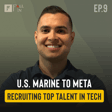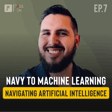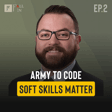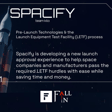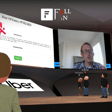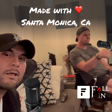Become a Creator today!Start creating today - Share your story with the world!
Start for free
00:00:00
00:00:01

Fall Into Tech #6: Alex Peterec - Army to Software Engineer
Former Army infantry soldier Alex Peterec shares his journey from military service to software engineering at Wells Fargo. Discover:
- Alex's transition from airborne infantry to coding bootcamp and then software engineering
- Insights into the Galvanize coding bootcamp experience and its role in his career shift
- The importance of networking and mentorship in breaking into the tech industry
- How to leverage military skills like teamwork and attention to detail in software development roles
- The day-to-day life of a junior software engineer and performance evaluation in tech
- Challenges of imposter syndrome and adapting to a new tech stack as a beginner
Whether you're a transitioning service member or curious about software engineering, this episode offers valuable insights into succeeding in the technical world of coding and development.
GUEST INFO:
EPISODE LINKS:
- Galvanize Coding Bootcamp
- Microsoft Software and Systems Academy (MSSA)
- Amazon Apprenticeship Program
- Pluralsight
- A Cloud Guru
- Udemy
- DOD SkillBridge
PODCAST INFO:
- Podcast website: https://www.fallintotech.com/
- Youtube
- Apple Podcast
- Spotify
- Zencastr
SOCIAL MEDIA:
HOST INFO:
Transcript
00:00:04
fall_in
All right.
Hosts' Introductions
00:00:05
fall_in
Welcome to the Fall into Tech podcast hosted by myself, Jamil. um I'm laughing just because we were messing around with the ah soundboard earlier, but I'm Jamil. I'm here with Michael Rodriguez. We're two Marines turned techies. And on this podcast, we chat with fellow veterans about their journey from military to technology.
00:00:25
Alex Peterec
Yeah.
00:00:27
fall_in
And um So yeah, ah this is in hopes of helping you with your tech career here.
00:00:35
Michael Rodriguez
Yeah, um tune in weekly for guest interviews. We discuss things like specific tech roles, stay in the life of those roles, different career paths you can take, and just overall tips for succeeding in tech.
Guest Introduction: Alex Piteric
00:00:47
Michael Rodriguez
And today, we're honored to have Alex Piteric. Thank you for joining us, Alex.
00:00:53
Alex Peterec
Hey guys, thanks for having me. Glad to be here.
00:00:56
Michael Rodriguez
Yeah, Alex is a former Army soldier turned software engineer and we always start with a fun little segment where our guest gives a fun fact. So what do you got Alex?
00:01:07
Alex Peterec
Yeah, so I am a child of a deaf adult, also known as a coda. So my parents are deaf. I've been speaking two language languages my entire life. So English and sign language. And On top of that, I'm teaching my ah dog sign language too. That's always been a thing. So um yeah, it's a unique fun fact about me.
00:01:28
Michael Rodriguez
Did not know dogs could learn sign language.
00:01:30
fall_in
Yeah.
00:01:30
Michael Rodriguez
That's interesting.
00:01:30
Alex Peterec
yeah Yeah.
00:01:31
fall_in
How does that work?
00:01:33
Alex Peterec
Honestly, it's just like kids, man. they They pick up sign language a lot quicker than you would think. And my parents taught our golden retrievers when I was a kid. So they know they knew, like, sit, you know go potty, food, stay, stuff like that. And I've been teaching my little man Conan over here. he's ah He just hit six months. But I've been teaching him. And they're just like kids. They they eat it up, man. It's another way to help them understand commands and and so forth. So it's awesome.
00:02:04
Michael Rodriguez
Nice.
00:02:06
fall_in
Yeah, buts that's so crazy. Well, yeah, why don't you kind of ah talk to us about your your military background here.
Military Journey and Challenges
00:02:14
fall_in
I know you're in the Army.
00:02:15
fall_in
Tell us why you joined that branch and dive into you know the time period you served, your MLS. um Yeah, let's start there.
00:02:15
Alex Peterec
Yeah.
00:02:25
Alex Peterec
Yeah. So I was an active duty army guy. I mean, the main reason why I joined at that time, I joined when I was 20 and pretty much I just wanted to go fight. That's pretty much it. Um, I joined, uh, with a ranger contract and option 40. It didn't make it, which is okay. Um,
00:02:43
fall_in
Mm.
00:02:43
Alex Peterec
Still went to an airborne infantry unit up in Anchorage, Alaska, 425. And I was there for seven years. I deployed to Afghanistan with Baker Company 3509 back in September 2017 to May 2018, working alongside 10 Special Forces group fighting ISIS-K. So we went on missions with them where there are extra bodyguards um for for missions, additional fire support. drivers, gunners, you name it. um We did that. Very lucky, very fortunate. And yeah, came back in May of 2018 and was around for a few more years after that. And I got out in May of 2023 after, well, yeah, May of 2023 is when I got out. Jeez. So it's been over a year at this point.
00:03:34
fall_in
Yeah. Uh, and it's been a crazy transition. I remember connecting with you when you initially got out and you were, like you hadn't had your first role yet. And, um, yeah, time flies, man. And look where you're at now. Um, but it's so crazy.
00:03:47
Alex Peterec
Yeah, it's crazy.
00:03:52
fall_in
Um, tell us about going back to the military. Tell us about, um, some of your best and worst times, um, while you were in.
00:04:00
Alex Peterec
Oh man, I would say probably best times were on deployment, ironically. Um, that's like the part I actually do miss cause you, you had a lot of purpose doing what you did or or being over there. And, um, I felt very fulfilled in what I was doing. Um, and there's, there's a part of me that like, I think there's a part of everybody that kind of has like that good old days feeling to where, you know, the war is over, which is one of the reasons why I got out. But.
00:04:32
Alex Peterec
If you could go back to that sliver of time and, uh, gosh, what TV show is it from? It may, I don't know if it's the office or what, but it says he's, there was an actor. He was like, you know, I wish there was a time for you or a way for you to know what the good old days are. in the moment, right? um And so I think a lot of times we romanticize that part. Even though it was also hard, that was also the time that where I felt like I had the most pride in what I was doing and I had a lot of purpose. um and And I loved it. I was very passionate about it and I really cared. um And I would say the worst time for me, oh man, it's kind of hard because
00:05:21
Alex Peterec
I think, honestly, it'd probably be post-deployment if I'm being completely honest. I think there was definitely a shift in my mentality, kind of like a cocky one, if I'm if i'm being honest with you, to where a lot of things that we were doing in Garrison Life, I was like, why why are we doing this? This is stupid. This is not what we did on deployment. um And even though it might be technically right, or really it didn't matter, the junior soldiers, when you're a senior specialist at that time, you know, when they haven't deployed, they don't understand that and they just see the attitude, right? And so um it kind of rubbed some people wrong way. Some people didn't really care.
00:05:59
Alex Peterec
But that ended up causing me a lot more issues than it needed to be if I'm being honest with you. One of my buddies um that lives here in Phoenix, he was like, yeah, you had an SF mentality or special forces mentality of, you know, let's just chill the hell out. Let's focus on what actually matters and stop asking why to where I was. I was a very independent person and I knew my job. but Um, I would butt heads with a lot of people, not because they were wrong or anything, but because a lot of the stuff we were doing at the big army level, uh, in Garrison life was just like, all right, this is not how we did things in, you know, overseas. Like, let's just get, like, let's use common sense here. and And sometimes when you go back to Garrison life in the army, you didn't do that. If, if I'm being ah like, you went, you went back to.
00:06:43
Alex Peterec
Stupid being stupid, unfortunately, if that if that makes sense. If you guys have deployed, you probably can relate to some degree.
00:06:51
fall_in
Yeah, totally, man. And so just like the the war kind of doodling down, is that the biggest reason why you got out?
00:07:02
Alex Peterec
Yeah, that was the biggest reason. So my last few years um i so I had a goal to go to SFAS and so I lost like 60 pounds and lost ah like just focused on myself and lost a ton of weight and leadership was very ah supportive of of that because I went to a company armor role at that time and ran a pretty good shop. So I went didn't make it that's okay. Not a big deal Met some really good guys that I'm still friends with today. But after that I also realized that like I struggle a lot with anxiety and With the war dwindling down um at that time essentially being over
00:07:42
Alex Peterec
um And also the mental health concerns I had for myself, I really asked myself, you know is this field worth it for me? Is this something that I really want to do? Because a lot of guys in these you know type A fields, a lot of times they might be type A guys in one area of their life, but they've got no family life or they've got sleep issues, they've got drug issues, infidelity issues, financial issues. um Alcohol issues. I mean you name it right it it bleeds over eventually and I'm and I guarantee you there are guys that are able to hold it together But I mean my my fitness coach is a former 10th Special Forces group guy And I'm glad I met him through Instagram because he lives here right in Phoenix But I mean he's like dude. You know like all my buddies have issues like that right and it's one of those things where
00:08:33
Alex Peterec
Seeing a lot of that stuff and and and the war being over, I was like, is this really worth what I thought it was going to be? Or is my mental health really worth that because of where I was at? I've always struggled with my mental health. And I try to be upfront with that and transparent because a lot of people don't, especially as guys, we want to act like we have it together. And I was like, you know to me, i'm I'm more than a uniform. I'm more than just, because at the end of the day, like the military is going to take and take and take. It's it's you know selfless service for a reason, right? And at a certain point, you've got to look at yourself and say, hey, how much am I willing to give and sacrifice to do that? And for me, at that point, I was 26, 27. And I was like, you know this this isn't worth it to me. you know like The amount of anxiety or stress I put myself under,
00:09:25
Alex Peterec
you know i I like parts of my job, but I wasn't even really doing those anymore. We weren't deploying anymore. And I'm like kind of sitting here like. I'm not really challenged intellectually. um I felt very, very stuck. And that's why I wanted to go to SFAS. But once I realized that it's really not for me, and I think there were more important things for me, I had to make that decision for myself. right And nobody nobody can. like You're the person, whether you you choose just to go in that field, or you decide to leave that field, or pursue certain things, like you're the only person that's going to have to sit on your rocking chair or lay in your deathbed and be like, hey,
00:10:00
Alex Peterec
you know i i made those choices and i have to be okay with that and live with those things right and for me i have like i i chose to walk away for you know the war being over but also my mental health um and wanting to actually prove to myself that i'm more than a uniform because for all I knew, like, that's all I wanted to do with my life was to be a soldier and to be be an airborne infantry guy and, you know, fight and deploy. And i I think definitely romanticized it to a high degree and idolized that. And when I hit that point of where I was like, I'm more or less of a man because of it, I was like, all right, this is not good. Because at a certain point, this will come to an end. And whether it is due to retirement or a med board or
00:10:45
Alex Peterec
because I'm choosing to walk away, you know, how are you going to like, at least you have a choice. Right. And so, um, I saw the writing on the wall for me and I decided to pursue something else. That's, that's simply what I did.
00:11:01
Michael Rodriguez
Yeah, no, thanks for sharing that info there.
00:11:04
Alex Peterec
Yeah.
00:11:05
Michael Rodriguez
And I guess that kind of brings an interesting question. Next question of, okay, um everyone infantry been in for a while. How do you even discover tech or get interested in tech?
00:11:20
Alex Peterec
Yeah, so when I decided to get out, I had less than a year. and I decided to get out in May, or not May, but I was thinking about getting out in like July or August of 22. And I decided to leave in September of that year. And so I had less than a year to to until I was getting out. I had like nine, 10 months. And I was like, all right, if I'm going to get out, I need to set
Transition to Tech: Opportunities and Challenges
00:11:50
Alex Peterec
myself up for success. Right. I kind of, I set it up ah and I looked at it objectively. All right. What, what fields out there are going to give me the best return on my investment or the best opportunity cost was the way I viewed it. And looking at like the STEM fields is like, all right, am I going to have to go back to school? Can I do some certifications? If it's like, I like the tech field, you know, what's out there. I just started doing a ton of research and.
00:12:18
Alex Peterec
You know, I, I was really considering, you know, doing, um, either law stuff or doing medicine, but I knew friends in medicine that were like, don't go into it. It is purely about the money and you will be working your butt off and you will be treated not the best. Um, there's, you know, a few people, I know there are lawyers, there's a gal that I did that was a lawyer and they're all great people, but they also, work to the bone and law school is you know tens of thousands of dollars per year in debt. And so is medical school, right? Depending on what you do. And so with my GI Bill, it only covers an undergrad. So unless I applied for an additional grant from the VA, medical school or law school, that's gonna be put on, you know that's debt that I have to take on, right? And we know that student loan debts are like the second highest thing to credit card debt and or auto loans.
00:13:12
Alex Peterec
And so I was like, all right, I don't want to go into a ton of debt. But I want to get into a field that's going to give set me up for the best chance of success. And so I kept on coming back to tech out of all the fields. I was like, all right, well, I built computers when I was younger. I always liked technology. So I started doing more research into cybersecurity, cloud computing, and cloud administration. But I didn't really know like how to even really like break into the industry. So I watched a ton of YouTube videos of like, oh, you just need this certification and this certification.
00:13:43
Alex Peterec
And I'm like, oh, really? like I only need a few certifications and I can break in thinking my like I needed some you know la you know some degree or anything. I mean, that's still a viable path and a good one, but the the tech industry in the US is so... um there's so much opportunity that you don't need one, right? You can start at different levels, whether it's doing it t help desk or going to a coding bootcamp and being a developer that way, or, um, you know, being a, what are they a SOC analyst for like entry level cyber, right? Like those are different things. And I was originally considering like AWS cloud administration for a skill bridge, um, which is, you know, a program that the DOD puts on and
00:14:27
Alex Peterec
I remember running into one of my buddies that i that I served with or deployed with, and he still lived up in Alaska at the time. His name's Dan. And he was like, hey, you should you should talk to Chris. He's um he's working at AWS as a software engineer, and he did something similar to what you did. And Chris was another buddy that I was really good friends with. And he got out, but he went to school then in Seattle. And um he got like his degree in psychology because he did green to gold but for the reserves. And turns out he also did a coding boot. He did the MSSA Microsoft coding boot camp and got on through the Amazon Veterans Apprenticeship that they had at the time. And so I called him up in December because I was like figuring out like what to do. I was like going through a ton of stuff at that time.
00:15:15
Alex Peterec
But once I had that phone call with him and another buddy I served with named Lyle, they're both software engineers at AWS. I mean, Chris has a degree in psychology and Lyle dropped out of his degree path, for I think for like exercise science or something. I don't want to, ah don't confirm me on that, but he was going to school in Colorado for a degree that he was like, yeah, this ain't going to make me anything. um And he dropped out and he went to a coding boot camp and he got on through their veteran apprenticeship as well. And so I spoke with them in December and they were like, hey man, yeah, like you can get on through a coding boot camp, um you know, we'll help you, you know, kind of get you set up like what you need to know. And for me at that time as a man of faith, I was like, all right, I think this is this is it because I've been praying about like opportunities to kind of open a door.
00:16:03
Alex Peterec
you know There seems to be a clear path here of buddies that I know and trust, like not somebody that's trying to just take my money um for this coding boot camp or this certification, but rather you know guys that I can truly trust that have been down this road, who have already been out, who are really successful in making over six figures. One doesn't have a degree, and the other one has a degree in psychology. and is you know making more money as an engineer at AWS than anything else, right? And so that's when I started doing a lot of research on software development and coding bootcamps. And that that's what led me to my coding bootcamp as a skill bridge that started in February of 2023 and lasted until June of that year, a month after I got out in May.
00:16:48
Michael Rodriguez
Gotcha. So, okay. So sounds like you went through galvanized bootcamp. Correct.
00:16:55
Alex Peterec
ye Yeah.
00:16:55
Michael Rodriguez
And can you kind of, so there's a lot of people that are trying to get into tech and you know, the big options for the most part are, you know, for your degree, computer science, coding bootcamp, or I suppose the third one is, you know, learn by yourself, build some really cool projects and you can get hired that way by just kind of showing your skill. Um,
00:17:16
Alex Peterec
Yeah.
00:17:17
Michael Rodriguez
I went through coding boot camp as well. Can you kind of walk someone through what the coding boot camp was like on a day-to-day basis? How it worked in case they're interested in one?
00:17:26
Alex Peterec
Yeah, for sure. So Galvanize for me was a full stack bootcamp. So for those that don't know what that means, basically it's where you work on website design or front end, and then you work on server development or back end, and then you also work with a database. So you're able to kind of get your your feet wet in every single thing to understand how things work at a very ah big level. That way at the entry level, whenever you start, it kind of gives you a lot of flexibility depending on what path you want to take. um And so that's what Galvanize teaches. um The ones they taught us, or our tech stack, was ah full stack JavaScript. So it was React, Express, Node, which Express and Node work together. And then we also learned ah Postgres for a SQL database. So stuck to a more relational database model. um And for us, the program was 17 and a half weeks, excuse me.
00:18:22
Alex Peterec
And so we were doing class about eight hours a day and I was on central time. So we were, I was getting up at like 4 a.m. Alaska time because I was also studying for my cloud certification, but we would start class at 6 a.m. um
00:18:38
fall_in
Chief!
00:18:39
Alex Peterec
So yeah, 6 a.m., we'd start class, but that was Alaska time. So central time, that was three hours. So at nine central, we would start and we would finish by about, I think like four to five. Some days it would be shorter, but that was the time that was allocated every day, um five days a week. And we we did that for four and a half months. And they pretty much like just shotgun effect, like debt or fire hose effect, excuse me. everything that you need to know at um at a very basic level um when it comes to full stack software development. And JavaScript is pretty, it stuck with that just because it's probably the easiest one to teach. um And I wish they would have taught Java as like a back end thing or a more object oriented language. But you know, beggars can't be choosers. it was It was a program that was paid for by the DOD
00:19:35
Alex Peterec
Um, or the VA, excuse me, and worked for DOD skill bridge. So didn't cost me anything. Um, but it was the best one for me personally. And it gave me the structure that I needed because I really didn't know where to start. Um, because like in the tech world, it's like you read about about cloud deployment. You learn about this language and that language. You, I mean, there's so much out there that I was like, how does all this even tie together? like that Like to me, that's kind of where I was at because I had no idea what I was getting into. um And so I kind of needed a guiding hand. I mean, I was still a self-starter and I wanted to do that. But I chose the boot camp because a lot of these veteran apprenticeships with various companies that
00:20:22
Alex Peterec
um they may partner with or companies just put on themselves require you to either have a CS degree or to have a coding bootcamp experience. And that's why typically if you're self-taught, that's kind of like the hardest route to go because There's like you you didn't go to a like a coding bootcamp, right? There's no curriculum to where they can kind of measure your your your your knowledge that they can use against like other peers that may be from that same program, right? um Not saying it's impossible. Typically, if you're going to be self-taught, you're probably going to get on at like a startup or a smaller company. um And it's definitely possible. It's not like it isn't. But I would say it probably would have been a lot harder for me to break in um on top of
00:21:08
Alex Peterec
the challenging market that it was at that time. I mean, it was people in 2023, I mean, we were they we were going through like tens of thousands of layoffs in those like first six months to eight months. And I remember texting my AWS buddies. I was like, yo, are you guys safe? You guys good? They're like, yeah, dude, our departments, we're revenue producing. We don't have to worry about it. We're good, man. I mean, it was stuff that was like, like tech support roles or marketing or just stuff like that that wasn't really revenue producing or projects that really weren't going anywhere and and they were perfectly fine. But you know as an outsider looking in from a company that's all you hear you're like yo bro you good. um So yeah I mean that's that's kind of what I did for my boot camp nine hours a day and there was there was time built in there.
00:22:00
Alex Peterec
with it being a skill bridge program for us to clear the installation and stuff for like army folks. The Air Force at that time requires people to be fully cleared and done with clearing before they start. I don't know how that is now. I know skill bridge rules have changed in regards to timelines and this and that because people were tired of losing their soldiers at six months instead of, you know, three, right? And so they're like, oh no, well you can only do a three month skill bridge. At that point, I was like, all right, these you know the DOD has to balance a fine line between meeting their manning demands and also setting up their soldiers for success. And at the end of the day, the career skills program, or not so the not the CSP, but the like SFL TAP program for the Army, is Soldier for Live Transition Assistance Program. I don't know what they call it for the Army or the Marines, but probably something similar.
00:22:55
Alex Peterec
um
00:22:57
Alex Peterec
a lot of times they kind of just throw so much at you and give you all these books. And they're, I mean, it's decent. Like don't get me wrong. It's not bad, but it's really, they're throwing you to the wind, man. Like they're throwing you to the wind and you've got to figure it out. And and the only person that's going to care is yourself at the end of the day, period. And that's, that goes for the same with the bootcamp. Like doing a bootcamp alone is not going to like It'll help you give you a good foundation, but it's not going to be a ticket like a golden ticket. It's not. like The same thing thing is like with cloud certifications. People think that it's a golden ticket if you get your AWS solutions architect and it's like, okay, well, yeah, you and 50,000 other people have it. So what what does that say? What skills or projects have you done in conjunction of that in order to justify
00:23:44
Alex Peterec
you're hiring what or your your potential and the reason why we should hire you as an entry-level engineer, right, or DevOps guy or or insert whatever rule you want, so.
00:23:56
fall_in
I've heard some really great things about Galvanize. like I think it's considered a premium coding bootcamp. Could you quickly talk to us about some of the prep work you might have had to do um for Galvanize?
00:24:08
Alex Peterec
Yeah, so yeah so so Galvanize is like hack reactor sister company. I can't remember which one bought out which, but they're like kind of merged. Galvanize is like their veteran version, I believe. um they yeah they're definitely They have a pretty good reputation. um The prep work for my program was just ah like a series of modules that I think was like roughly about 20 hours worth of coding and work. um But it was just learning the basics of variables and just like solving just basic algorithms. Like it wasn't anything like major.
00:24:48
Alex Peterec
um But I will say at that time when you're learning and drinking through a fire hose and trying to cram Um, it's definitely a challenge. Um, honestly, the reason why the, that prep work is there is really, it's kind of like a filter to where, Hey, if you're not willing to do this prep work, then we don't want you in our program. Right. Because they, in order for galvanize or hack reactor to get paid, you have to be able, you have to essentially get placed into a job or a similar one in the IT field in order for them to get paid by the VA.
00:25:23
Alex Peterec
They only get paid like 50% initially, or not initially, but like halfway through the program. And then like the other 50% is once you actually find meaningful employment in that field. That's a pretty flexible term, but that's like the IT field, right? So they have like they have some money and skin in the game in order to help you out. um But that prep work was like basic stuff of just creating creating variables of different different types, learning how to manipulate strings, integers, um just really basic stuff like that and from there just solving basic algorithms and that's pretty much it.
00:26:02
Michael Rodriguez
And, um, you know, I had already gotten out before I went to, you know, my coding bootcamp. Can you talk to us about, okay, someone's listening that's still in. What is skill bridge? How do you find a skill bridge opportunity or how do you get into this program?
00:26:19
Alex Peterec
Yeah. So skill bridge is like the DOD name or the DOD wide name ah for something that the army would call ah the career skills program.
Skill Bridge Program
00:26:29
Alex Peterec
And basically skill bridge is a retraining program that the department of defense allows service members to do within their last, I believe six months of training. It could change. It could be four months now. I don't really know. I'm not in. um But essentially, it's a way for you to set yourself up for success on the outside. And even if you do do that program, like with CSP, you're still getting paid by the army while you do it, right? So you're getting active duty pay.
00:26:58
Alex Peterec
and so this partnership with these companies or somebody you may find that's willing to train you, essentially, like you're still getting paid full-time army wage, whether you're an 01, 02, 04, or or E5, you're getting that rate of pay the entire time you're doing your CSP. right So it it gives you a really good kind of buffer window to like gain some skills and experience to transfer you to an entry-level role on the outside, whether you want to go be a plumber or a truck driver or you want to go be a lineman or you want to go into IT and do software or cyber. There's some really good programs out there or um you can also do like a custom route to where you can actually call up an organization and you can talk with them and say hey you know like I'm in
00:27:46
Alex Peterec
um like the Like the one that I think would probably come to mind is like, if you're like a JAG officer, right? And um you wanna do lawyer stuff on the outside, you could probably call a law firm and say, hey, I've got all this experience doing this stuff in the army with JAG, right? This is all my lawyer experience, whatever that may be. um You know, I'd really love to partner with you guys and secure a ah role in the outside. You know, it might be more complicated than that, I don't know, but this is just a generalized example. Um, and basically you just have to fill out a custom form for like the army side, uh, for like like the career skills program. And then you can send that off to, to JAG themselves are the ones that would have to approve it. Um, it's just like a simple investigation to make sure it's a legitimate organization. Uh, they, they, they.
00:28:31
Alex Peterec
make sure you're gonna be given a curriculum to learn and be set up for success for the civilian world and that civilian job, right? So um that's kind of one example I would use, but for linemen, you could go to lineman school. um I know a guy that I served with did that and he's doing really well for himself right now, but it's not just tech. It's it's it's very it's across various industries um and you know it's within four to six months of service and you still get paid while you're like on active duty while transitioning out, right? So it's a really good program. It really sets you up for success. And I would say if you don't know about it, go to your your local tap office or transition assistance program. That's what it would be in the army for the other branches. I don't know what it'd be healthy. You know what that equivalent would be. um
00:29:21
Alex Peterec
and More than likely they'll have information a lot of leadership try to keep it on the DL because they don't really want to lose their soldiers Six months early because we all know they have a retention problem and you know, I wonder why but um Yeah, it's it's a great program. I think it's probably the best thing I did for myself getting out and I am glad that I was able to get the funding from vet tech and I'm glad that it didn't cost me a dime and it saved me 20 grand, right? Because that's how much galvanized cost. So I'm very, very thankful for that. But that's kind of how, that's what skill bridge is and how it works and how you can get started on that.
00:30:01
Michael Rodriguez
Yeah, I also use vet tech. For those who didn't know, it's a program where you don't touch GI Bill, they would just give funding every new fiscal year. But currently, it's not a thing anymore. um It stopped earlier this year, unfortunately, but maybe one day they'll bring it back hopefully. um But going forward here, so
00:30:17
Alex Peterec
Yeah.
00:30:22
Michael Rodriguez
Talk to me about how you actually you don't got an interview for your first role or how
Breaking into Tech: First Role
00:30:26
Michael Rodriguez
you got into it. Was it through the bootcamp? Was it through a veteran's program? How did you actually land that first role?
00:30:32
Alex Peterec
Yeah, so this is this is the hardest part about breaking it into breaking into tech, especially software development, but I think any industry. um Tech is just a lot harder to break into nowadays because the competition is so high. ah For me, how I got on was not through my bootcamp, but network connections from it. so From day one of my bootcamp I was networking like mad. like i Like every single day like if I wasn't coding and doing my bootcamp stuff I was on a LinkedIn call interviewing and talking with somebody. I was sending out connection requests like I i got the premium because you get it like one year for free as a veteran. Signed up for that was doing like a hundred connections a week just
00:31:17
Alex Peterec
And I've got like over 1500 connections now, but like, I think by the end of my bootcamp, I had networked with over 40 people or companies or something like that. Um, within those four months, like I, I, I did not have a life outside of all of this. Like I, like I knew that I, like the way I viewed it, I would be screwing myself over if I did not work my butt off to break into this industry and give it everything I have. um And so for me, one connection I ran into was a galvanized bootcamp graduate who was also from the army as well. But he was working for Wells Fargo and he was one of the guys I've connected with. And um you know we had spoke a little bit every now and then. He was a really good guy.
00:32:04
Alex Peterec
And he actually hit me up one day and he was like, Hey man, you know, our, our next, uh, vet cohort for Wells Fargo is coming up here. And, uh, the fall for 20, uh, 23. And, you know, are are you still looking for a role? Like, are you still interested? And at that time I was wrapping up my bootcamp and I had only had like one or two interviews and I had, I had applied to about 150, 200 roles tops by the time I got an offer from Wells. Um, But even then, like those odds right like those odds are actually pretty good um compared to the horror stories of what I've heard from other people. I had about think I had about ten like five to 10, probably seven, actually, like initial phone screens, or 10 initial phone screens. About half of those went to a second round, and then about half of those turned into an actual offer. um And for me,
00:33:05
Alex Peterec
I was kind of shocked about the whole Wells Fargo thing. um Their process was the longest out of all of them, but it's also because they had a thousand applicants and only 40 slots to fill that I later find out. And only a third of those were for software software engineers. The other ones were for marketing. for It wasn't just a tech program. It was a veteran hiring initiative put on by Wells Fargo. Um, and it's a two month, uh, or eight week long, uh, full-time internship. So, uh, you get paid full-time hourly, but it's at like a reduced rate. Um, and then from there, you know, which like the conversion rate to full-time employment after that is like 97%. The 3% that don't is typically they get another offer from another company and they choose to go. Most of the time their plan is they want to bring it on.
00:33:52
Alex Peterec
Um, so if you get in through the internship, unless you do something like to really hurt the company or do something reckless, uh, more than likely you will get hired on if you're brought on through the, and the the veteran full-time internship. But that's how I got on was through a, uh, a network connection that recommended me for the vet program. Um, which once again, networking, any interview that I had was from networking purely, like it wasn't any cold application. There was only one time out of those like three offers or interviews that I had, where the founder of a company reached out to me. And they were a smaller company based on the East Coast. Nexlink Labs are really great. um But they were they were waiting to bring on more more customers at that time. And with them being a smaller company, you know their budget's a little bit smaller. So they were like, hey, we'd love to have you, but you know we can't bring you on and not pay you, right? so
00:34:47
Alex Peterec
It was one of those things where I reached out to them and I was like, Hey, I've got a full time offer. You know, I'd really like to know cause they were, they were actually my first pick if I'm honest with you. Um, and they were, they were really great, but just timing didn't work out. And so Wells Fargo gave me a really good offer. And, uh, I put Phoenix as my top location because I have a few friends I serve with and deployed with that live here. Like two of my best friends from the army live here. and I put the, I think it was like Phoenix or Scottsdale as my first location and the second was Chandler. I didn't know that like Chandler was on the other side of Scottsdale and you know there were two towns that are essentially within like right in Phoenix and it's just really the spread out metro but I mean they gave me Arizona and they were like yeah can you get down here in three weeks and I was like
00:35:36
Alex Peterec
I'll figure it out. I'm going to make this happen. So within three weeks, I packed up my entire life and drove from Alaska down to Arizona to start a whole new career after getting out.
00:35:47
fall_in
I can't even imagine that dry pan.
00:35:50
Alex Peterec
It's beautiful. um But I was glad it worked out because I was able to get the move the military movers to come on a one week notice, which is like almost unheard of. I'm extremely lucky that that somehow happened. um And then throughout the drive, unfortunately, started having a lot of leg pain. And the first day I was here, as I was unpacking my car, realized my left leg was swollen. And I could barely walk, and I couldn't figure out why. Well, I went to the yeah ah ER, and it turns out I had a blood clot in my groin. So that was my first day in Arizona. And it was like 100-plus degrees.
00:36:32
Alex Peterec
um I'll be fully honest, I got at that time, like I was pretty much broke. um And I had like nothing in my apartment except like the stuff from my car, like my kitchen stuff and enough clothes until my shipment of household goods got here. um And yeah, I was in the hospital like the first week I was here and I had to get a massive blood clot. The reason why was because I had essentially put, slept and drove in a car for three and a half, four days. and was pulling like 12 hour days, just hauling butt, getting you down here as soon as possible. And I didn't realize that I almost unintentionally killed myself. So um I am very thankful to the man above for
00:37:15
Alex Peterec
Um, you know, for the doctors and hospital staff are saving my life. Um, it wasn't because it was like a genetic thing. They definitely believe it was due to, um, may thunder syndrome and it being provoked due to the long periods of of sitting and may thunder syndrome is basically where an artery puts pressure on a vein. And so it's actually pretty common, but a lot of people don't sit in a car for three and a half, four days and also sleep in it and barely move. I did that. Um, And so yeah, I was on blood thinner for like six months after that. Um, wasn't able to ride my motorcycle, which is like my therapy. Um, and so yeah, I know dude, it's been a wild ride the past past year, year and a half. Like when I say it's been the toughest one I've ever had it, like I, I definitely mean it. So, um, you know, I'm, but I'm very thankful that I've got a full time job, you know, within tech, especially with the economy right now.
00:38:10
Alex Peterec
Um, you know, very thankful that it's something stable, thankful for this little golden retriever bundle of fluff over here that I've got. Um, and yeah, I just, just thankful to be here, man.
00:38:22
Michael Rodriguez
Yeah, no, it's definitely a wild ride, man. Glad you're okay.
00:38:27
Alex Peterec
Yeah. Appreciate it.
00:38:28
Michael Rodriguez
um And now, for your current role, talk to us about, you know, day in the life of a software engineer, you know, some people know they want to be a software engineer, they don't know what that actually means. Sometimes, um what does a day in the life look like?
00:38:48
Alex Peterec
Well, for me, um, this is always going to be dependent company and and team wide, right? But for me, my day to day, Monday through Friday is typically starting to work at about nine o'clock. Honestly, it's kind of like a nine to five. Like it's not pretty good work-life balance for me. Um, I've got meetings every single morning, Monday through Thursday. ah For our daily team stand up typically they are supposed to be about 15 minutes a lot of times They go longer than that just because we're talking with our product manager
00:39:23
Alex Peterec
um or our project manager, those two work hand in hand along with our scrum master. We talk about any blockers we may have, which are um issues resolving code ah that we need help with or relying on somebody else. That way we can stay productive throughout the the the sprint that we do, right? We do agile methodology here at Wells Fargo, specifically scrum. And um For me, besides those daily standups, we'll also every two weeks do a sprint retrospective and review. We'll do a planning session right after that for the next two weeks and we'll assign the the stories across the board. um But most of the time I'm like the whole, I would say the whole marketing hype or just internet hype you see of,
00:40:17
Alex Peterec
you know, ping pong tables. I mean, yeah, they probably have them, you know, and all these, you know, bougie lunches that are paid for and this and that and these bougie offices, like, I just got a standard office, man. I mean, yeah, I got some nice chairs. I got a nice standing desk that I use, but I mean, it's kind of like a cookie cutter office. It's nothing like majorly fancy. Like it's, it's a desk job, right? um And so I think a lot of people think that they're going to be living some, you know, bougie high lifestyle and like just super lax and write five lines of code and that's it.
Life as a Software Engineer
00:40:48
Alex Peterec
Um, in reality, that's not the case. Like there are times where it can, it can be really stressful. Like when I was starting out and and learning, I mean, still I am, you're always learning.
00:40:57
Alex Peterec
But I mean, i over the past you know six months, I mean, there's been times where I've i've stayed up late, you know, eight, nine o'clock to get something done because we need this done by this sprint or hey, we're going like we've had this software release that we pushed once or twice because the business team gives us stuff last minute. So we're sitting here documenting things, testing things. It's not always just writing code and that's it, right? Like there's so much more than just, oh, I'm going to solve this algorithm. on the screen and do it the most efficient way possible. like A lot of those like coding interviews and with leak code and stuff, like
00:41:38
Alex Peterec
Most of the time, you're not really doing that in the day-to-day life of a software engineer. You're just not, right? Like, one, it's a filter to see who can put up with that. um It's an indicator of problem-solving skills. But at the end of the day, you can have someone that's amazing at lead code, but has terrible interpersonal skills and has terrible documentation skills. And at the end of the day, you could be a bad software engineer because of that, right? Like, that's that's only one part of being a software engineer. But for me in the day to day life is like, yeah, get up at nine or start work at nine. Excuse me. Um, have daily standups at 10 Monday through Thursday. Um, I'm in office Tuesday, Wednesday, Thursday, predominantly. I work a hybrid schedule. I forgot to mention that. So Monday, Friday, typically I'm remote, um, gives me a lot of flexibility just because, I mean, I can swap a remote day here or there, but I like Monday or Friday because like, I can go take care of appointments when I need, I can go grocery shopping when I need, while still getting my, my, um,
00:42:36
Alex Peterec
my hours in and making sure, as long as I don't miss my meetings on Mondays, I'm good, man. like i I text my teammates, let them know, hey, I'm going to go take care of this. I'll be back at this time. Just reach me on Teams, since that's what we use. um and it It gives me a lot of flexibility. and On our in-office days, a lot of times, most people like do six hours because that's what's required of us. um just because like hey a lot of people have families and kids so they'll you know drop them off for school while that time is done their kids are out of school they'll go pick them up and they'll do the remaining two hours from home right and um I think that work-life balance is really really important I think the whole hundred percent remote work thing I think that's going away unfortunately there's a lot of companies that want to justify commercial real estate costs but I will say as a junior junior developer I have
00:43:27
Alex Peterec
appreciated the in-person lessons and mentorship because a lot of times it is hard to get a hold of people as a software engineer. Like when you're a junior, you need a lot of time and mentorship. You are asking so many questions that it's almost just easier to have somebody right next to you. It really is. um And until you're like a mid-level or senior and you can really be productive on your own, um You know, that that remote work thing is going to be hard to come by as an entry-level developer. I mean, there was a time for it with COVID, but most of these companies are like, hey, get your butt back in office if you're a junior developer. And like to a certain degree, it does make sense for the junior guys because, they like I said, mentorship is really required. But once you're a senior, I think the whole remote thing, I think that should really be
00:44:11
Alex Peterec
Um, supported, right. But that flexibility I've got at Wells Fargo, but that's, that's kind of what life looks like for me here in Phoenix. And my office is like 15 minutes away. So yeah.
00:44:23
Michael Rodriguez
Nice and um you know obviously in the military, there's different ways depending on maybe your unit or your rank that you get evaluated. How are how are you evaluated as a software engineer? Is it you know quarterly, is it yearly, annually, semi-annually, whatever it is?
00:44:42
Alex Peterec
Yeah. So for, so officially there is a semi annual and a annual review. So every six months you do a review slash check-in and then you do a annual review. So for me, I actually like two days ago just got done with my first six month, uh, review. And so basically we had back in January. Um, I have joined the team because for the first like two, three months, I was simply, I had no team. I was doing as much learning as I could learning the tech stack. Um, I had met my lead engineer that I would be working with, but I hadn't even, I wasn't inner.
00:45:20
Alex Peterec
I wasn't involved with the team doing stand-up. It was just like, hey, do as much learning as you can for the first two to three months on Udemy. Luckily, I still had my army email and Udemy is free for army soldiers. So I was using that for Java, for MongoDB, for Kafka, um for everything we use here at Wells Fargo. um I took advantage of that. Even though they provide stuff through um A Cloud Guru, um I just found the stuff on UDB to be a little bit more worthwhile for me because I'd already used it prior.
00:45:55
Alex Peterec
Um, so in January I started and I had met my my manager, um, or like, excuse me, my manager's manager. And we had set expectations of like, Hey, as a journey developer, this is what we're wanting from you. A lot of it was, um, understanding like the core concepts of architecture of like how, um, all the applications are working together and the dataflow coming from like Pfizer of a transaction company, um, all the way to certain credit card benefit teams all the way down to ours. Because i'm I'm on a credit card benefits team and we run the Autograph Journey credit card for Wells Fargo. It's like a $50 statement credit annually. So that's my specific team. um But pretty much with that, sorry, I lost my train of thought. What were you talking about? Gosh dang, where are we going with this?
00:46:46
Michael Rodriguez
ah Just how you're evaluated.
00:46:48
Alex Peterec
Oh, evaluated. Yes. Okay. And so the expectations were set out like, Hey, and we want to, we want you to be contributing like on average, like two story points out of eight for the first like six months you're, you're on the team. Um, but also having a learning mindset, like it was very, like there were requirements that were very easy to obtain. The only one I haven't obtained was like the easy 900. Azure fundamental certification. um Honestly, just because there's just been so much learning. um But I mean, most most of the requirements I was exceeding, like I was on average contributing four to six story points um for the past six months, um always had a learning mindset and was according to my to my manager, but also my lead. I'm a quick learner, I'm eager to jump in and help out and I think the mindset and the willingness to learn is the biggest part.
00:47:41
Alex Peterec
of being a junior developer because this stuff takes time, man. like like You think you know a lot when you leave a boot camp and then you get to your first role and you're like, Oh my God, imposter syndrome is real and I have know what I'm doing and they're going to find out I'm a freaking fraud. like ah Like I think for the first three months I kept on telling my mentor, I was like, I'm going to get, I'm going to get fired. I'm going to get fired and they're going to think I'm a fraud dude. They're going to know like, just because I was always hard on myself and I hadn't like, I had very little, little Java experience. And so like I was my tech stack. I was like starting fresh. Like I came from a full stack JavaScript.
00:48:20
Alex Peterec
you know SQL relational database to where it's like, I'm going to object-oriented back-end programming, I'm learning about Kafka um data distribution, and I'm learning about a non-SQL database or a non-relational database, and I'm like, what the heck is this? right so i mean i was like I felt like I was starting from ground zero again, even though like I had seen a lot of stuff. um you know I felt like I was really overwhelmed. and so With the annual reviews that'll be coming up in January of next year for me, um those requirements I spoke about, it's just like, hey, instead of two story points, it's like four to six, which I'm already doing right now. And by that point, they really want me to get like my easy 900 certification. I haven't focused on it because honestly, learning so much, like you just feel at times overwhelmed and you feel feel burnt out.
00:49:15
Alex Peterec
So it's it's one of those things where when you're a junior, you're you're juggling a lot and they know that. And as long as you're open and honest during those mid reviews or annual reviews, or even just throughout, just talking with your manager, and you're transparent about that. like i mean they They want you to succeed. like i don't I don't see any hostility. I don't see any people out to get you at Wells Fargo. like i don't I don't see that. right I have a pretty healthy work environment, even though some of my seniors that have been around for about 10, 15 years are like, you're on a pretty good team.
00:49:51
Alex Peterec
right but sometimes the industry can be really cutthroat. And so um one of my, one of my seniors, he's actually leaving and he's been my mentor for the past six months. Amazing guy, great guy, love him to death. um But he, you know, he's leaving and he's like, Hey, look, like you've got a good team here, but like, Don't be so no i so naive to think that everybody's going to be always willing to help you out. like There are people in the industry that will be the first chance they will get. They will try to sell you out down the river to look better for their lead or for their manager. um And I haven't experienced that as of yet. um I always try to have good intentions. And for me, like coming with a very big team oriented mindset, I'm like, why would you do that?
00:50:34
Alex Peterec
you know But at the end of the day, you're you're you're assessed as an individual right from from your manager. And at the end of the day, what really matters is, did you meet that stuff according to your manager on your review? And if that means doing something that some people may deem unethical or shady, You know, some people could do it. I'm not saying that's happened at Wells Fargo. Like it has I certainly haven't done it. I haven't seen it happen, but I mean, I i guarantee you it's out there. I mean, i I don't see why it would it be. I mean, I would say unethical people can be in any industry, right? So.
00:51:10
Alex Peterec
um that kind of brings the whole you know performance review full circle. But that's how I measured at Wells Fargo and like the standards that have been set for me. um they've been They've been obtainable. They're not like absolutely illogical demands of a junior developer. Like they're they're they're they're working with you at a snail's pace and they're really trying to invest in you here at this company. And I'm really glad that I actually got brought on it and and worked with them. i'm I'm very thankful for them and giving me the opportunity to have my first role because I don't know where I would be right now if i have what it wasn't for this company.
00:51:45
Alex Peterec
so
00:51:47
Michael Rodriguez
Awesome. Yeah, and I'm glad you got that role. And yeah, good point on imposter syndrome. I mean, you can be working for for years, you're still going to feel it whenever you do something new or whatever maybe so doesn't go away, you just got to learn how to manage it.
00:51:55
Alex Peterec
Yeah, absolutely.
00:52:00
Alex Peterec
Yeah.
00:52:02
Michael Rodriguez
um And then for hopefully by the time this comes out, this will be old news with the crowd strike.
00:52:03
Alex Peterec
Yeah.
00:52:09
Michael Rodriguez
um Look today's again,
00:52:12
Alex Peterec
Oh my God. Yeah.
00:52:14
Michael Rodriguez
We don't really know who did it, but prop maybe a software engineer who introduced a bug into some kind of software, which then you know took out airlines and banks and all kinds of things today.
00:52:19
Alex Peterec
Yeah.
00:52:28
Michael Rodriguez
So the real question is, have you pushed anything to break anything yet?
00:52:29
Alex Peterec
Yeah.
00:52:33
Michael Rodriguez
Any code of production that broke anything yet?
00:52:35
Alex Peterec
No, no, I haven't broken anything and pushed it to prod unintentionally. Um, that I know of right for all I know we could go live in the next 2-3 weeks and it's like my name is on that git blame annotation and you know I'm gonna have a talk on my manager now um I As of right now, there hasn't been any serious stuff. I will say the the the biggest thing you always like get told in like a coding bootcamp or mine was like, don't push your ENV file. right Don't push your ENV file to your GitHub with your credentials and so forth. Well, and unfortunately, I did something very similar to that. right it was um It wasn't like a public domain or anything. It was just a company and a team Git.
00:53:23
Alex Peterec
um but I didn't even realize I had done it until like a month later when we were like reviewing stuff. And I was like, Oh my God. Like, but like immediately I had told my, my lead, I was like, Hey, I just realized that this happened. Like just come clean. Like, you know, it's like stuff, stuff like that as a junior is, I'm not saying it's going to happen. Like that you should want to strive to do that obviously. But, um, you know, that's where the joke of the intern pushing stuff to prod kind of comes from, right? Like it's an unintentional thing. I don't think anybody would actually, you know, do that on purpose. And if you do, like you come up on the NetAce app and you say something. Um, but it's also why you have all these code reviews, like, like you don't, it's why you do unit testing to test every single method that you write. It's why you do automation testing to make sure
00:54:16
Alex Peterec
your application integrates well and and works as expected on a daily basis and not just in one environment, but across three to four environments, right? So there's so many levels of testing that go on and also review of that testing that by the time it gets to production, it's also gone past QA to where we've got good QA here that's like really hounding us every step of the way to ask, why are you doing this? Why is this not like, I mean, to the point where QA drives you mad, but it's their job. And but you know talking with the whole Microsoft thing, I mean, more than likely they probably have a rollback mechanism. I mean, it still probably costs, I mean, it costs airlines and banks, it probably costs people millions, right? And so whatever director or lead or team out there, um you know if they're not let go, they're probably gonna have some serious eyes on them um and remarks their way if we're being honest. I mean, you cost a company millions of dollars or an industry millions of dollars,
00:55:16
Alex Peterec
Yeah, that's nothing when you're only paid 150, 200K a year if you're a higher up engineer, right? But that's um they more than likely had a rollback mechanism. More than likely, you know they really reversed to that version of code that worked across the board. They've probably solved it. um I mean, I went to Whole Foods you know just before I got on this podcast with you guys. And like half their machines were down because of because of this outage, right? like This has affected all like at the Phoenix International Airport. like Flights are delayed still. like It's affected you know tens of millions of dollars, probably. And so it's it's nothing to to joke about. like When you don't push reliable code to production, or you don't test it thoroughly, or something slips through the cracks, um somebody's going to be held accountable, right? And you know I don't know who that's going to be. From what I know, Wells Fargo wasn't affected, and I'm not going to speak on that. But from what I know, our team isn't affected.
00:56:13
Alex Peterec
And I'm glad that that hasn't happened and we're not the ones who did it, so.
00:56:17
Michael Rodriguez
Rumor has it it was ah your .env file.
00:56:21
Alex Peterec
Dude, wow, man, that would be the worst. Honestly, there are times to where I have some pretty bad luck. So if I'm ever on a Microsoft Azure team in the future, God forbid that happens, man. Oh my gosh, that would be that would be terrible.
00:56:40
fall_in
Imagine if we got punished ah like ah like we did in the military. um But yeah, speaking of the military, um especially being infantry men, coding is so foreign, ah especially to me, you know probably to you.
00:56:56
fall_in
We're both infantry guys. And you know um I'm thinking about ways to like, because you know for me, tech was always out of sight, out of mind. And I'm always trying to figure out ways to like show the fruits of tech to to grunts. whether it's the culture, or the pay, or whatever. um And I'm noticing a lot of your posts on LinkedIn as well. It seems very like better and forward. what's um what's one sort of trans or What's one tip you would give to like a transitioning vet? About tech.
00:56:56
Alex Peterec
Yeah.
00:57:28
Alex Peterec
One tip, transitioning into tech is a vet.
00:57:32
fall_in
but like what what do you What do you think? um Let me rephrase it. What's one thing you wish every transitioning vet knew about the tech industry?
Advice for Veterans Entering Tech
00:57:44
Alex Peterec
There's a lot of overlap and a lot of flexibility. So what I mean by that is like you can start out at a help desk, you can start out as a junior developer, You can just start out as a SOC analyst if you get that role. Typically, you need a degree for that, but there are ways. um And you can you can start at that level. And you if you get on with a company and you network right and you start learning, you can you can go to a different area of tech like DevOps or software development pretty pretty well with like either a coding boot camp or a certification of some kind. like There's a lot of flexibility when it comes to tech that
00:58:26
Alex Peterec
I didn't really think that you would have, right? I didn't really think about that. Like one of my one of my other good friends I served with, um he got his degree, but really, I mean, he did it for the internship, but he's in cyber. But he was like, hey, dude, like you should go to cyber route and actually switching over from a developer role to cyber is actually really good. And it's actually really marketable because a lot of cyber guys don't know how to code. and it's actually a really good thing that we're sought after at sought after because you can problem solve to ah a level and you have a skill set that cyber guys don't have. And I didn't even know that. um you know I thought it was kind of like these like siloed off areas that you didn't know. Whereas like they're developers who instead of doing developing stuff after 10, 15 years, they want to go be a Scrum Master or they want to go do DevOps instead. um Or they want to go do site reliability engineering after 10, 15 years. And they were able to go do it. and it
00:59:20
Alex Peterec
Um, you know, they all either had a computer science background or a coding bootcamp, um, or a degree in it of some kind, which, I mean, you can do a degree ah of it t if you want, but I mean, at that point you can just get a two certifications and get like a apprenticeship or something. And that's equally as good because in tech. What they care about is your experience. The degree is just to help you get your foot in the door if you do the whole college route. That's that's really what it is. like Most of the time, if you get a CS degree, you're going for the internship because the internship is when it's going to get your foot in the door to build relationships to say, hey, yeah, we'd love to have you for next next you know next summer as an intern. Hey, we'd love to bring you on full time.
01:00:00
Alex Peterec
right and That's how a lot of things work out in this industry. Like the degree is only one part and like other countries like India, like how like a lot of my coworkers are, they're contractors. um For them, they have to have a degree in computer science because the the competition so fierce here, it's not as much. So it's like, there's a really good window of opportunity and ah a flexibility for veterans because here's the thing, like you don't have to know everything. I sure as hell didn't. and I was able to break into the software engineering field without a computer science degree, without any college debt, saving four years of school, and I'm getting paid the same amount. I'm not getting paid any less because I don't have a degree, and I'm still working as a software engineer. like To me, the way I viewed it was, dang, I get a ah really good return on my investment working in the IT industry
01:00:54
Alex Peterec
And I mean, there are people that go to college for four years that are still making less money than I am, right? like It's one of those things where there's it's a really good industry for opportunity. And I think a lot of veterans would be selling themselves short. Because here, at the end of the day, even if you do a skill bridge for IT, t or a coding boot camp, or or whatever, and you don't like it, you don't have to do it. I mean, yeah, you can get a job. But like there's no requirement saying that your CSP program, you have to go go be a lineman, or you have to go do this or that. like There's no contract like the Army saying that you have to go do this thing.
01:01:29
Alex Peterec
right um you You might choose not to go. And you you're like, you know what? I tried this. I really don't like it. um And that's the worst that happens. like you're not You don't have golden handcuffs for four or five years like you would with an enlistment contract, man. like like The world is your oyster when you get out. And like yeah, it's freaky when you're given the school like the school bus you know wheel to actually drive at this point after it's been after it's been driven for me for like seven years. That was the analogy I'm using. Because like for me, it's like, OK, well, what the hell do I freaking do with this? you know I'm the one that's driving the bus now. But on the flip side, you can go do whatever you want. And if you don't like it,
01:02:09
Alex Peterec
like Don't turn off an industry because you're like, oh, I've i've never been a nerdy guy. Dude, I was never a coder. I honestly thought I was too dumb for it. like honest I really did. like i I love to read. I like to challenge myself physically and intellectually, and I knew I could do better than where I was at. But I didn't think I would be like at the computer science level. right I really didn't. and I'm here, every single one of my co-workers has master's degrees in computer science. They're really smart. they've I mean, they're really kind people. I mean, yeah, a lot of them are pretty nerdy, right? But my interpersonal skills um definitely shine my documenting documentary, not documentary, but my documenting skills, excuse me, for all the code that you are making or testing.
01:02:56
Alex Peterec
really comes to shine because I have a good attention to detail and I really care about the work I'm doing. And the technical skills, I'm learning as I go along, right? So I've got a lot of these good soft skills that a lot of veterans have that people, they that you guys would really, really um excel at. As long as you put forth the effort and you want to learn, it's not impossible. Like like you're selling yourself short if you think that, oh, I shouldn't go into tech because it's nerdy or it's um it's way too challenging for me. like You're just, you're just pigeonholing yourself at that point, man. So don't pigeonhole yourself. Um, you know, it's a very flexible industry. and And so I would say realize the amount of flexibility and freedom that you have and lean into that and realize just cause if it doesn't work out, even if you try it, you can go back to school, right? If you use vet tech or not vet tech, but if you use a CSP program and you get some training,
01:03:51
Alex Peterec
At that point, like you don't have to go do it. You can go back to school if you want instead. like It's an opportunity for you to figure out what you want to do, and it's completely free. like In the CSP, hell, like I knew people that did barista stuff as a CSP, and they were still paid by the army. Obviously, like I don't think that's the most wise use of a CSP, but it's still technically one you could do. you know um But that's that's my take on it in regards to the IT industries. Don't pigeonhole yourself. There's a lot of flexibility. There's a lot of overlap. And you're selling yourself yourself short if you do pigeonhole yourself.
01:04:29
fall_in
Love it. Well, this has been so insightful, man. We push for an hour. And yeah, I learned so much. And I got to say, like, before we end it, do you ever miss jumping out of planes now that you're coding?
01:04:48
Alex Peterec
There's a part of me that misses it. um I do miss the adrenaline rush. i But at the same time, I also have knee and back issues. And on my 25th and last jump of November of 2023, I had a two and one malfunction and I almost died. I had a cigarette roll and I collided with a jumper midair and we rode each other shoots to the ground and I don't know which one we rode and it was posted on wetsuit or one of the the airborne infantry pages you find on social media and Everybody that saw us fall. They all thought I was dead or they thought we were dead um and
01:05:28
Alex Peterec
there was three feet of snow on the ground. And honestly, by the grace of God, I was like, all right, this is my last jump in my 25th one. I'll just take that as a good sign working for the chaplain at that time as a chaplain's assistant. Let's just ah let's just leave it on on that note and just not do this again. So that's kind of, there's a part of me that that misses it, but honestly, it's just a romanticized version. I left for a reason, you know, the jumping got old after a certain amount of time, including all the weight, you know, I've got knee and back issues. yeah There's a time and place for it. I'm very thankful for my service, but it's only a chapter.
01:06:03
Michael Rodriguez
Yeah, thanks for sharing that and Alex you really appreciate having you on. um Definitely drop some good knowledge there and we're going to link your LinkedIn in the description.
01:06:08
Alex Peterec
Yeah.
01:06:16
Michael Rodriguez
um So if anyone wants to reach out to you and is there anything else you're working on or anything you want to plug? I know you have a blog and stuff.
01:06:23
Alex Peterec
Yeah, so I've got a blog on Medium that you can also find on my LinkedIn page as well. um It's medium dot.com at Thomas Petterich, pretty straightforward. um I post every now and then. I haven't posted in a while, but I've just been focusing on my job. but ah Most of my articles have really been more veteran focused. I'll be doing a one year performance review um or one year review in September of like what life is like as a junior software engineer. So that'll be something to look forward to next few weeks as I'll be publishing the whole post one year from the Army. So that'll be more veteran focused, but um I just like to write and journal. I've been journaling for years. I started doing that in Afghanistan. So yeah, check out the LinkedIn. I'm always willing to chat and network with other veterans, always wanting to help.
01:07:08
Alex Peterec
um and hopefully my blogs do as well because I'm just trying to pay it forward and that's all I ask other veterans to do is is to do the same. as just If I help you, you help somebody else because honestly once you get out you realize we're all that we got man like seriously like networking with other veterans it really does help.
01:07:28
fall_in
Yeah, big fan of it. And, um, yeah, we'll post, uh, we'll post the resources that we talked about in the podcast description. Um, sorry, I lost my bearing earlier in the beginning. I'll, I'll haze myself for that. But, um, yeah, we'll post our socials and, um, uh, if you got, you know, suggestions or if you want to be on the pod, feel free to reach out to us. And, um, thanks again for listening folks.
01:07:55
fall_in
All right. That's the pod.
01:07:55
Alex Peterec
yeah
01:08:21
Alex Peterec
Yeah. Have a good one guys.

